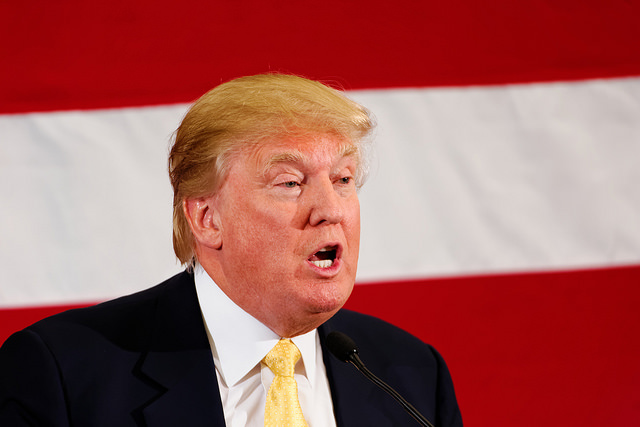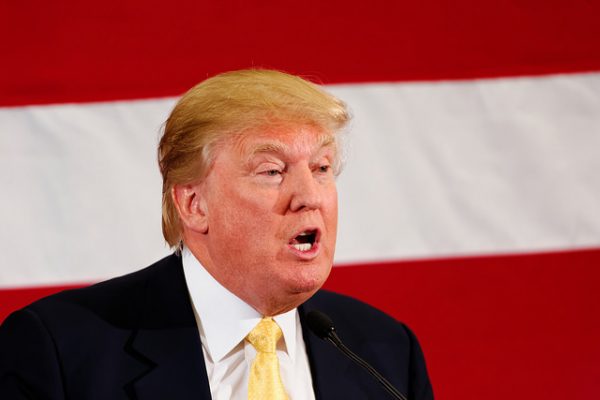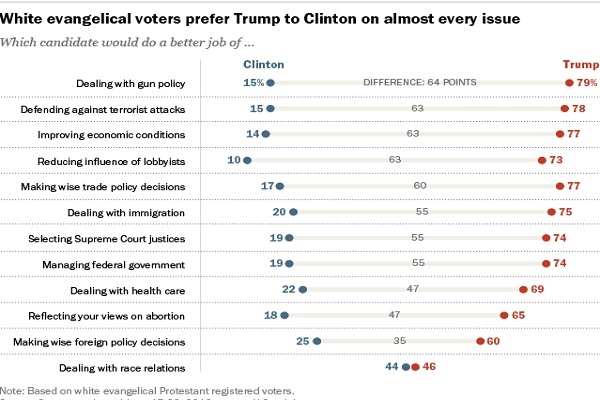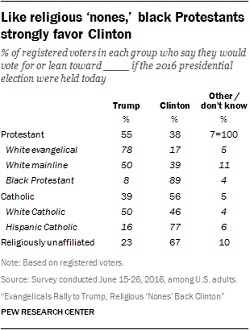
Evangelicals Leaning Towards Trump As Clinton Sees Support from Religious ‘Nones’
- By WRN Editorial Staff --
- 15 Jul 2016 --

A declining share of the U.S. public says it is important for the president to have strong religious beliefs.
WASHINGTON, D.C. (July 13, 2016) – Evangelical voters are rallying strongly in favor of Republican presidential candidate Donald Trump, a new Pew Research Center report finds. Indeed, despite the professed wariness toward Trump among many high-profile evangelical Christian leaders, evangelicals as a whole are, if anything, even more strongly supportive of Trump than they were of Mitt Romney at a similar point in the 2012 campaign.
Evangelicals Leaning Towards Trump As Clinton Sees Support from Religious ‘Nones’[/tweetthis]
At that time, nearly three-quarters of white evangelical Protestant registered voters said they planned to vote for Romney, including one-quarter who “strongly” supported him. Now, fully 78% of white evangelical voters say they would vote for Trump if the election were held today, including about a third who “strongly” back his campaign.
Meanwhile, religiously unaffiliated voters – those who describe their religion as atheist, agnostic or “nothing in particular” – are lining up firmly behind Hillary Clinton over Trump, much as they supported Barack Obama over Romney in 2012. Two-thirds of religiously unaffiliated registered voters say they would vote for Clinton if the election were held today, just as two-thirds intended to vote for Obama at a similar point in the 2012 campaign. Religious “nones” are, however, somewhat less enthusiastic about Clinton’s candidacy (26% now strongly support her) than they were about Obama in June 2012 (37%).

Religious “nones” were among the strongest supporters of Bernie Sanders during the primaries, and some observers have wondered whether Sanders’ supporters would ultimately support Clinton during the general election. But even among the religious “nones” who supported Sanders over Clinton, nearly nine-in-ten (87%) say they would prefer Clinton over Trump if they had to make that choice today. Similarly, on the GOP side, white evangelical Republicans who supported someone other than Trump during the primaries are much less strongly supportive of him in the general election than are evangelical Republicans who wanted to see Trump get their party’s nomination. But nine-in-ten or more in both groups – Republican evangelicals who supported Trump during the primaries and those who supported another candidate – say they would vote for Trump over Clinton if the election were today.
 Like religious “nones,” black Protestants are firmly in Clinton’s corner. Catholics also lean toward Clinton, though they are sharply divided along racial and ethnic lines; Hispanic Catholics overwhelmingly favor Clinton over Trump, while white Catholics are evenly divided between those who prefer Trump and those who favor Clinton. Half of white mainline Protestants prefer Trump (50%), while about four-in-ten (39%) favor Clinton. Support for Clinton among black Protestants and Hispanic Catholics mirrors the preference for the Democratic candidate among blacks and Hispanics overall.
Like religious “nones,” black Protestants are firmly in Clinton’s corner. Catholics also lean toward Clinton, though they are sharply divided along racial and ethnic lines; Hispanic Catholics overwhelmingly favor Clinton over Trump, while white Catholics are evenly divided between those who prefer Trump and those who favor Clinton. Half of white mainline Protestants prefer Trump (50%), while about four-in-ten (39%) favor Clinton. Support for Clinton among black Protestants and Hispanic Catholics mirrors the preference for the Democratic candidate among blacks and Hispanics overall.
The survey also shows that a declining share of Americans say they want a president with firm religious convictions. Today, just 62% of U.S. adults say it is important to them that the president has strong religious beliefs, down from 67% in 2012 and 72% in 2008. This change may partly reflect Republicans coming to terms with the fact that they have nominated a presidential candidate who is widely viewed as not particularly religious. Indeed, the share of Republicans saying it is important to have a president who has strong religious beliefs has ticked down 4 percentage points since the 2012 campaign. But this decline among Republicans predates the nomination of Trump, having dropped 8 percentage points since 2008. And it mirrors changes among Democrats as well; while a larger share of Republicans (74%) than Democrats (53%) say it is important that a president have strong religious beliefs, declining shares of both groups hold this view.
This latest survey by the Pew Research Center was conducted on cellphones and landlines from June 15 to 26 among 2,245 adults, including 1,655 registered voters. The survey’s overall findings about the state of the 2016 presidential race were previously released in Pew Research Center’s July 7 report “2016 Campaign: Strong Interest, Widespread Dissatisfaction.” This new report provides a detailed look at the religious dynamics of the 2016 campaign, and it also includes new data on views about religion’s role in American public life.


















